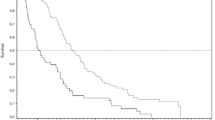Abstract
PURPOSE: This study was designed to determine whether the ability of interferon-γ to upregulate the expression of a human tumor antigen improved the therapeutic efficacy of a radionuclide-conjugated monoclonal antibody. METHODS: Tumor xenografts of the moderately differentiated human colon tumor cell line HT-29 were grown in athymic mice. Constitutive levels of the human tumor antigen, tumor-associated glycoprotein-72, were measured before and after treatment with interferon-γ. Antitumor effects of an131I-labeled antitumor-associated glycoprotein-72 monoclonal antibody, CC49, were determined by measuring changes in tumor volumes in the respective groups of athymic mice. RESULTS: Interferon-γ induced a time-dependent and dose-dependent increase in tumor-associated glycoprotein-72 expression in the HT-29 tumors. Immunohistochemical staining revealed a more homogeneous tumor-associated glycoprotein-72-positive tumor cell population in tumors isolated from mice treated for eight days with interferon-γ, which accounted for the enhanced tumor localization of131I-CC49 in mice. That experimental model was used to examine the antitumor effects of combining interferon-γ with131I-CC49. Administration of 300 μCi of131I-CC49 to mice bearing HT-29 tumors induced a transient suppression of tumor growth. Conversely, a long-term, sustained HT-29 tumor growth suppression was achieved in mice given 300μCi of131I-CC49 and interferon-γ. In fact, the cytokine/radioimmunoconjugate combination eradicated any evidence of tumor in approximately 30 percent of the mice. CONCLUSION: The ability of interferon-γ to enhance tumor-associated glycoprotein-72 expression substantially augmented the antitumor effects of the radioimmunoconjugate. Those observations provide additional argument for use of a radioimmunoconjugate in combination with a cytokine to improve tumor diagnosis and therapy.
Similar content being viewed by others
References
Attallah AM, Needy CF, Noguchi PD, Elisberg BL. Enhancement of carcinoembryonic antigen expression by interferon. Int J Cancer 1979;24:49–52.
Greiner JW, Horan Hand P, Noguchi P, Fisher PB, Pestka S, Schlom J. Enhanced expression of tumorassociated antigens on human breast and colon tumor cells after recombinant human leukocyte alpha-interferon treatment. Cancer Res 1984;44:3208–14.
Borden EC. Augmented tumor-associated antigen expression by interferons. J Natl Cancer Inst 1988;80:148–9.
Kantor J, Tran R, Greiner JW,et al. Modulation of carcinoembryonic antigen messenger RNA levels in human colon carcinoma cells by recombinant human γ-interferon. Cancer Res 1989;49:2651–5.
Guadagni F, Witt PL, Robbins PF, Schlom J, Greiner JW. Regulation of carcinoembryonic antigen expression in different human colorectal tumor cells by interferon-γ. Cancer Res 1990;50:6248–55.
Hauck W, Stanners CP. Control of carcinoembryonic antigen gene family expression in a differentiating colon carcinoma cell line, Caco-2. Cancer Res 1991;51:3526–33.
Yan X, Wong JY, Esteban JM,et al. Effects of recombinant human γ-interferon on carcinoembryonic antigen expression of human colon cancer cells. J Immunother 1992;11:77–84.
Horan Hand P, Colcher D, Salomon D, Ridge J, Noguchi P, Schlom J. Influence of spatial configuration of carcinoma cell populations on the expression of a tumor-associated glycoprotein. Cancer Res 1985;45:833–40.
Guadagni F, Schlom J, Johnston WW,et al. Selective interferon-induced enhancement of tumor-associated antigens on a spectrum of freshly isolated human adenocarcinoma cells. J Natl Cancer Inst 1989;81:502–12.
Greiner JW, Guadagni F, Goldstein D,et al. I.P. administration of interferon-gamma to carcinoma patients enhances expression of tumor-associated glycoprotein-72 (TAG-72) and carcinoembryonic antigen (CEA) on malignant ascites cells. J Clin Oncol 1992;10:735–46.
Colcher D, Horan Hand P, Nuti M, Schlom J. A spectrum of monoclonal antibodies reactive with human mammary tumor cells. Proc Natl Acad Sci USA 1981;78:3199–203.
Muraro R, Kuroki M, Wunderlich D,et al. Generation and characterization of second generation (B72.3) monoclonal antibodies reactive with the TAG-72 antigen. Cancer Res 1988;48:4588–96.
Kuroki M, Fernsten PD, Wunderlich D,et al. Serologic mapping of the TAG-72 tumor-associated antigen using 19 distinct monoclonal antibodies. Cancer Res 1990;50:4872–9.
Gero EJ, Colcher D, Ferroni P,et al. The CA 72-4 radioimmunoassay for the detection of the TAG-72 carcinoma associated antigen in serum of patients. J Clin Lab Anal 1989;3:360–9.
Sikorska H, Shuster J, Gold P. Clinical applications of carcinoembryonic antigen. Cancer Detect Prev 1988;12:321–55.
Cournoyer D, Beauchemin N, Boucher D, Benchimol S, Fuks A, Stanners CP. Transcription of genes of the carcinoembryonic antigen family in malignant and nonmalignant human tissues. Cancer Res 1988;48:3153–7.
Stramignoni D, Bowen R, Atkinson BF, Schlom J. Differential reactivity of monoclonal antibodies with human colon adenocarcinomas and adenomas. Int J Cancer 1983;29:539–45.
Thor A, Ohuchi N, Szpak C, Johnston WW, Schlom J. The distribution of oncofetal antigen TAG-72 defined by monoclonal antibody B72.3. Cancer Res 1986;46:3118–24.
Greiner JW, Guadagni F, Noguchi P,et al. Recombinant interferon enhances monoclonal antibody targeting of carcinoma lesionsin vivo. Science 1987;235:895–8.
Kuhn JA, Beatty BG, Wong JY,et al. Interferon enhancement of radioimmunotherapy for colon carcinoma. Cancer Res 1991;51:2335–9.
Greiner JW, Dansky Ullmann C, Nieroda C,et al. Improved immunotherapeutic efficacy of an anticarcinoma monoclonal antibody (CC49) when given in combination with IFN-γ. Cancer Res 1993;53:600–8.
Kurzrock R, Rosenblum MG, Sherwin SA,et al. Pharmacokinetics, single-dose tolerance, and biological activity of recombinant γ-interferon in cancer patients. Cancer Res 1985;45:2866–72.
Maluish AE, Urba WJ, Longo DL,et al. The determination of an immunologically active dose of interferon-gamma in patients with melanoma. J Clin Oncol 1988;6:434–45.
Rosenblum MG, Lamki LM, Murray JL, Carlo DJ, Gutterman JU. Interferon-induced changes in pharmacokinetics and tumor uptake of111In-labeled antimelanoma antibody 96.5 in melanoma patients. J Natl Cancer Inst 1988;80:160–5.
Author information
Authors and Affiliations
About this article
Cite this article
Greiner, J.W., Guadagni, F., Roselli, M. et al. Improved experimental radioimmunotherapy of colon xenografts by combining131I-CC49 and Interferon-γ. Dis Colon Rectum 37 (Suppl 2), S100–S105 (1994). https://doi.org/10.1007/BF02048441
Issue Date:
DOI: https://doi.org/10.1007/BF02048441




